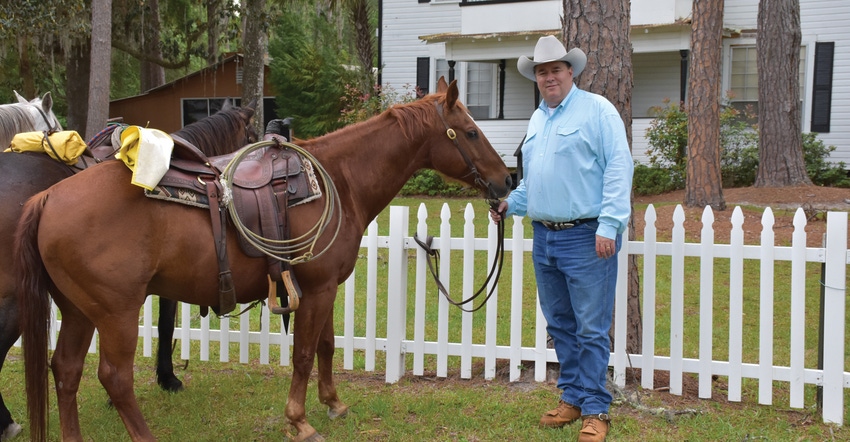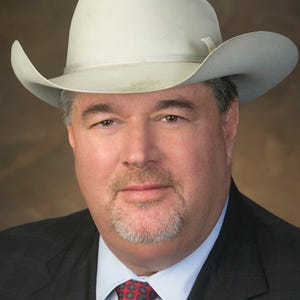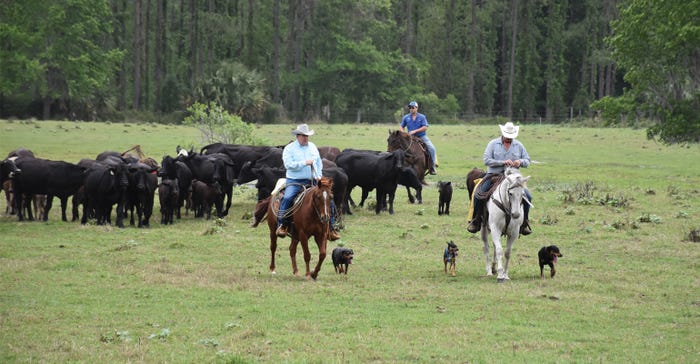Marty Smith: Collaborating for a better beef business
NCBA’s incoming president has his priorities firmly fixed on the association and the future of the beef business.

“I specialize in never running for office.” An interesting quote, that, coming from the man who will step to the fore as the 2020-21 president of the National Cattlemen’s Beef Association (NCBA).
Meet Marty Smith, perhaps the only NCBA president who didn’t run for the job. But life has a way of going in directions you never planned on. In Smith’s case, the cattle business is the better for it.
NCBA goals
Stepping into his year as NCBA president, the Florida rancher plans to keep building on the strength and success the association has hewn both in Washington, D.C. and out in the country.
But none of Smith’s goals as NCBA president start with “I.” “This is not at all about me. One of the things that I feel very fortunate about is that with our officer group and with the executive committee that we have in place today, we are a team. It is very much a team mindset with all of us. This is a group of very dedicated, very intelligent people who all have the well-being of the industry and individual producers as their primary objective.”

And so, what NCBA accomplishes in 2020 and beyond are goals that the officer team and senior staff will achieve together. “NCBA’s role is to help cattle producers — regardless of their role in the industry — stay on the land.”
Part of that is what NCBA has always done — represent the entire beef business within the political and regulatory environments in Washington, as well as work to make the beef business sustainable in the country.
Beyond that, Smith and the leadership team are committed to making NCBA a more active participant in beef-related conversations. “We’re starting to really respond. You know, for years we have not responded to some of the challenges or some of the criticism, and that’s left a gap in the conversation in our industry. We’re committed to changing that in the year ahead.”
Smith thinks it’s a positive change. “I think our membership wants to see more engagement on NCBA’s part. We’re doing that now. You’re going to see NCBA taking a much more active role, both in the media, but also when we really look at the social media aspects of it, getting more of our information out — not only to our membership, but to the public,” he says.
“We’re going to respond to some of these criticisms. We’re not going to sit back and just let whatever group, from wherever they may come from, say whatever they want to about our industry, and about what we do.”
While Smith dislikes the term “sustainability,” that’s really what he’s about. “We’ve got to look at our long-term future. And part of the sustainability thing is staying in business. I think NCBA’s role is to help cattle producers in whatever area they’re in and whatever aspect of the business they’re in, stay on the land,” he says.
Clearly, NCBA has been a longtime advocate for beef producers on the governmental side. That will never change.
But NCBA’s role will expand. “We’ve got to show the rest of the world that we’re producing beef the right way. The products we’re producing are being produced safely and in a manner that can help to improve the environment. Cattlemen and women are the original stewards of America’s natural resources, and we’re doing everything we can to ensure that we’re taking care of — and in many cases, improving — the air, land and water around us,” he says.
“Whether we talk about carbon sequestration, climate issues or any other environmental topic, we have to do a better job of getting our message across to consumers and to our detractors. America’s beef producers are competing in a global marketplace, like it or not, and so we have to be able to tell our story, both here and in every nation where we’re marketing our product,” he says.
Smith says some of those issues also resonate in conversations about beef’s role in the diet, an issue likely to be front and center during his term as NCBA president. Through the Beef Checkoff, beef producers have made tremendous progress in showing that beef is a nutritious part of a healthy diet. “We’ve got to keep that going, and really push that harder to show beef’s benefits — instead of allowing antibeef advocates to cast beef in a negative light.”
However, Smith is pragmatic. The issues that NCBA is now confronting are the same issues that the beef business has confronted for years. But progress is happening, and Smith is committed to the collaboration of dedicated, smart people who are just as committed as he is to helping the business move forward.
“With a team concept, we’re going to do this as a group, so that we continue to move in the same direction,” he says.
Beyond that, however, his year as NCBA president will be pivotal from another perspective. “I think one area we can’t overlook is the fact that 2020 is an election year. And this is a very pivotal election coming up.”
Rural America stepped up and went to the polls four years ago. Smith is adamant that rural Americans must show up again.
“We do have hope. But it is hope only in the sense of, if we do our work and we do the things that we can do to ensure our voice is heard, then we have a chance. We’ve got a chance of something that’s really going to benefit us for a lot of years in the future.”
Path to the top
Smith’s path to the top volunteer position with NCBA is different from most, he admits. He began his involvement with beef business associations in the 1990s, when he ascended to president of the Florida Cattlemen’s Association.
Smith hails from north-central Florida, in between Gainesville and Ocala. “My family has been involved in the cattle business … we’re coming up on 170 years now,” he says. “We’ve been here in Florida since 1850.”
The cattle, however, have been there much longer. “Where we ranch, we’re coming up on 500 years of cattle being there when Ponce de León brought cattle to Florida in 1521.” Some escaped and made their way to the state’s interior. They were wild as deer, but the Seminole soon learned to take advantage. In fact, the small town of Wacahoota, where the ranch is near, is Seminole for “cattle pens.”
In addition to running a cow-calf operation, Smith is also an attorney specializing in agricultural and environmental law.
While he was involved in different aspects of NCBA and its predecessor, NCA (National Cattlemen’s Association), he figured that was as much involvement as he wanted. He had a young family, his ranch and his law practice to think of, and that’s where he focused.
Limited NCBA involvement first
But in 2009, he was asked to serve on what then was the NCBA Audit Committee. “That first opportunity to serve as a volunteer at NCBA showed me how big the challenges we faced actually were. Fortunately, it was a great group of people, and we managed to face down some of those challenges and put NCBA on a good path moving forward.”
Then, in 2015, the beef business lost one of its up-and-coming leaders when Richard Gephardt died unexpectedly. Gephardt was NCBA treasurer at the time, and in the wake of his passing, Smith was asked to step up and take on the responsibility.
“I thought about it and talked with my family about the opportunity, and decided to take the plunge to serve as a member of the NCBA officer team. My background as a member of the Finance and Audit Committee prepared me with a good understanding of the importance of building a reserve fund for the association — and also with some of the upcoming challenges we faced, particularly as it related to lawsuits that might be coming in the future.”
That was something that had never been part of an NCBA budget before. “Building reserves became a part of the budgeting process, and it’s something that I and other members of the Finance and Audit Committee are very proud of.
“Because of our efforts to build a reserve, I felt like we were headed in the right direction; and at the time, I thought I might serve as a member of the officer team for just a few years.”

That’s because, while the treasurer is vital to NCBA, it’s not a position that normally moves into the officer ranks. Which suited Smith just fine.
However, when Craig Uden was NCBA president, he urged Smith to take a more active part of the officer team. “As I became more active, and increased my participation, I was asked to consider taking on the role of NCBA vice president.”
He agreed. “Again with the idea that I had things I wanted to see us move forward with, and that I had an opportunity just to serve the industry, to serve the organization and to hopefully move us in a positive direction. So that’s how I got here.”
About the Author(s)
You May Also Like



